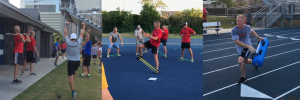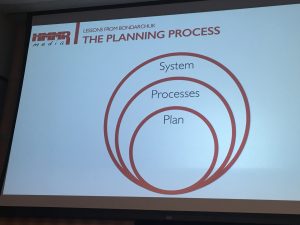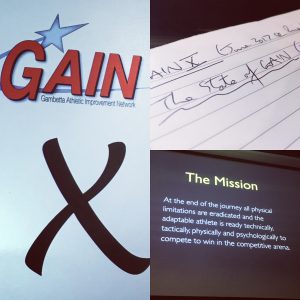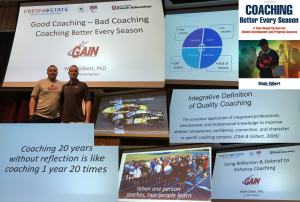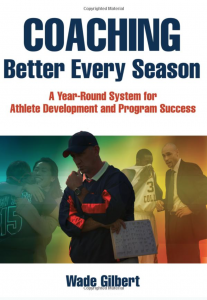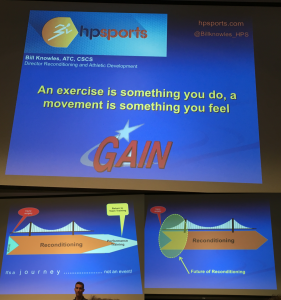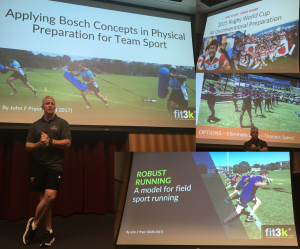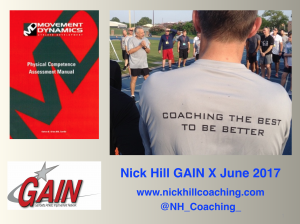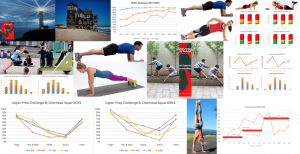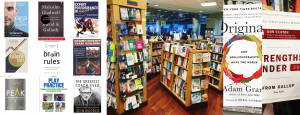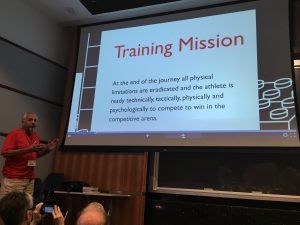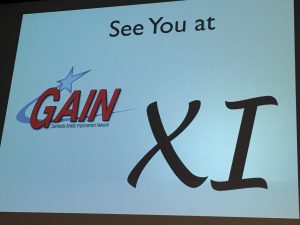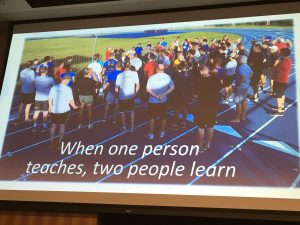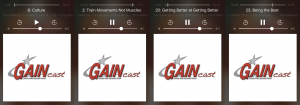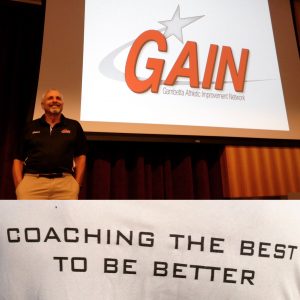Recap of GAIN X:
Having just returned home from another awe inspiring GAIN experience, my 3rd GAIN in a row now, I thought I would share with you some of the key parts of this experience and some of the key messages shared throughout the week…
GAIN X Theme
“Making Connections to Foster Meaningful Change and Innovation”
There are 4 prongs to GAIN: Sport Coaching, Athletic Development, Sports Medicine and Physical Education within One Team to achieve One Mission: At the end of the journey all physical limitations are eradicated and the adaptable athlete is ready technically, tactically, physically and psychologically to compete to win in the competitive arena.
One of the things GAIN does is challenge your thinking and the phrase “you can’t solve 21st century problems with 20th century solutions” certainly rings true as we strive to continually improve for the players we coach and the athletes we train.
Another big part of the GAIN philosophy is specialising in being a Generalist and having the 4 prongs to GAIN all in one place certainly facilitates this process of cross pollenating information, ideas and experiences between roles and across different sports.
This year there were people from all corners of the world… Australia, Croatia, Germany, Ireland, Norway, England, Scotland, Canada, and the USA working in a variety of sports… Gymnastics, Rugby, Soccer, Athletics, Hurling, Canadian Football, American Football, Basketball, Volleyball, Lacrosse, Handball and Wrestling along all levels of the Long-term Athletic Development Pathway… Kindergarten, High School, College, University, Professional, Amateur and the Elite.
6:30am Teaching Sessions
These are key parts to the GAIN learning experience where you are able to experience the application of the ideas presented in the presentations by ‘learn by doing’ as we take part in practical sessions that cover key GAIN principles of Athletic Development including the principles of ‘Movement not Muscles’, ‘Movements through ALL planes of Movement’ and ‘Toenails to Fingernails’.
This year’s themes included ‘Sticks and Straps’ by Steve Myrland, Movement ABCs using a jump rope to teach Rhythm by Greg Thompson, Ground Based Ability which included rolls in all directions and planes by Andy Stone and James Marshall, Bill Knowles’ Philadelphia Union MLS Warm-up, Frans Bosch’s Hip Lock by John Pryor, Mini-bands by Steve Myrland, Special Strength and Plyometric Progression with Jim Radcliffe, the Trainability Assessment by Randy Ballard and Robust Running by John Pryor.
All these things could be applied immediately into your teaching, coaching and training sessions. That is the beauty of the GAIN experience… some things can immediately be implemented into what you do straight off the plane, other things in a few weeks time and months and then some things ready for the following season…
Presentations
The formal part of the Coach Development process during the GAIN Conference are the presentations from some of the world’s best coaches. Each presentation is around 90 minutes with a 15 minute window at the end of people to ask questions to the presenters.
They kick off with Vern’s annual welcome address of “The State of GAIN” presentation on the Tuesday evening. This can be viewed here via the Facebook “live” link…
https://www.facebook.com/225083718737/videos/10155596612233738
Below are some of the key presentations for me from GAIN X:
Wade Gilbert: Coaching Better Every Season
Wade is WORLD CLASS. Wade is renowned around the world for being one of the leading practitioners in Coaching Science and particular bringing that science to life and applying it to real teams and organisations. Wade is a Professor of Coaching and Sport Psychology at Fresno State University, is the Editor-in-Chief of the International Sports Coaching Journal and has presented all around the world.
Wade made 2 presentations: The 1st one was “Good Coaching – Bad Coaching” and the 2nd one was “Using Reflection and Debrief to Enhance Coaching”.
Wade’s 1st presentation took us through the moments that a coach goes through… Pre-season, In-season, End of season and Off-season and breaking down the key parts of theses moments. He breaks Pre-season into Vision, Core Values and Behaviour Standards. In-season into Athlete Learning, Practice Design and Competition Coaching. End of Season into Program Evaluation, Coach Evaluation and Athlete Recognitions. Off-season into Coach Wellness and Ongoing Learning.
Wade’s 2nd presentation focused on reflecting as “coaching 20 years without reflection is like coaching 1 year 20 times”, it’s an acceleration of learning in the programme and Systematic Reflection is the “separator”. He went through several techniques to help improve your coaching.
Quality Coaching is Quality Teaching.
Integrative definition of Quality Coaching:
The consistent application of integrated professional, interpersonal, and interpersonal knowledge to improve athletes’ competence, confidence, connection, and character in specific coaching contexts. (Côté & Gilbert, 2009)
There are 3 components of quality coaching:
- Coaches’ Knowledge;
- Athletes’ Knowledge;
- Self-knowledge.
I highly recommend reading Wade’s book… It has so many great gems to use in your own coaching to help take it to the next level.
Bill Knowles: Re-conditioning
Bill is WORLD CLASS. He is the ‘go-to-guy’ in the field of reconditioning from ACL knee surgery for elite athletes. He is the Director of Reconditioning and Athletic Development for HPSports and the Philadelphia Soccer Union in the MLS. (Major League Soccer) This is now 3 years in a row that I have seen him present at GAIN. His passion, enthusiasm and energy are off the scale.
He is always trying to push the boundaries at the edge of innovation and challenging protocols. He refers this to following a Performance Model rather than a Medical Model. Athletic Development and Physical Literacy are at the core of his reconditioning process through training based prevention. He focuses on what athletes CAN DO and this very evident when he gets athletes in the pool running within days of having surgery. He sees injuries as a brain injury and views keeping the connections in the body in tact as very important to allow the athlete to return to the field as soon as possible. “Movement is medicine for creating change in a person’s physical, emotional and mental states.”
In summing up, he said this about the future of re-conditioning… “We may need to focus less on what could go wrong, and think more of what could go right.”
John Pryor: Robust Running
John is WORLD CLASS. He has an extensive background in Athletics and more recently Rugby Union while coaching at the Brumbies Super Rugby team in Australia, the Wallabies (i.e. Australian national team) and then the Japan national team leading up to the 2015 Rugby World Cup (RWC), where he was instrumental in the planning and preparation of the biggest upset in history of the RWC, with a true David v. Goliath moment, where Japan beat one of the major rugby playing nations in South Africa, 34-32, with a try in the last minute of the game. In the previous seven tournaments (the RWC is held ever 4 years = 28 years) Japan had managed just one victory, against Zimbabwe in 1991, and was widely regarded as being among the minnows. Before coaching the Japanese national team he coached the Sungoliath Suntory club team in the Top League beforehand. He has just joined the Fiji rugby team in preparation for the 2019 RWC in Japan.
John made 2 presentations: The 1st one was on “Applying Bosch Concepts in Physical Preparation for Team Sports” and the 2nd was on “Robust Running for Field Sports”.
One of the many challenges he faced was making sure the Japanese players would be physically ready to meet the demands of playing in the Rugby World Cup against the best teams in the world. They weighed up Risk v. Reward and decided they couldn’t do everything and they distributed training throughout the week. He covered several of the Frans Bosch concepts of Hip Lock, Co-contractions, and Options Training and has a Movement Based Strength approach to training.
As a sports coach, would you like a Fast Runner v. a Robust Runner…?
“Track sprinting is creating near perfect mechanics in a predictable, stable environment. Robust running is trying to optimise mechanics in a highly unstable and unpredictable environment.”
John showed numerous examples of hoe he applies the concepts to practical exercises and drills. Hip Lock coaching and training are the foundations to progress to more advanced exercises and drills which include Core Activation, Co-contractions and Ground work. A piece of equipment that John utilises is the water-bag and an exercise he uses is the FLOW or SHAKE challenge.
John also emphasises for Hamstring Robustness, i.e. the best prevention to pull a hamstring, is to run fast regularly, i.e. a focus on drill quality.
The other presentations included the following:-
- Training Myths, Misconceptions, Half truths and Lies by Michael Joyner;
- Coaching Better Every Day: Transcending and Transforming the Coaching Culture by Steve Myrland;
- The Volume Trap – Good, Bad or Ugly by Steve Magness;
- Revisiting Function – Enhancing Connections by Joe Przytula;
- Sports Science – Servant or Master by Michael Joyner;
- The Big Dance – Rhythm and Tempo in Movement by Greg Thompson;
- Three for Thursday by Vern Gambetta;
- Transfer of Training – Bondarchuk and Beyond by Martin Bingisser;
- Over (Early) Specialisation – The Long View by Randy Ballard;
- The Robust Athlete by Jim Radcliffe;
- Organising Effective Workouts by Vern Gambetta and Jim Radcliffe;
- Making the Performance Team Work by Randy Ballard;
- Coaching the BEST to be BETTER by Vern Gambetta.
Meals times
These are invaluable informal learning opportunities and are the lifeblood of the GAIN experience, constantly pumping blood around the veins of GAIN. Every second is utilised throughout the conference and every opportunity taken to suck more information out of people. Anything and everything can be discussed during these times. They are a great way to network, get to know people and build meaningful connections.
Walking to and from the lecture theatre is another opportunity that is utilised to chat with people, whether continuing discussions from the previous presentation walking from the presentation to lunch or dinner or continuing the conversation from the dinner table from breakfast and lunchtime to the presentation room.
Then there’s the retreat to the renowned Valhalla refreshment room on campus after the day is done to continue the conversations until you decide to go to bed.
Brief but Spectacular Coaching Tutorials
Another informal opportunity to learn something was through these short 15 to 30 minutes tutorials where Vern asked different people to share something that they have experienced or were working on. Each evening there were 4 groups.
This year I presented my experiences and findings of doing a Physical Competency Assessment (PCA) across a whole school with 2100 pupils, both boys and girls, from 5 to 18 years old.
Panel Discussions in the evenings after dinner
Each evening there was an informal panel discussion with all the faculty members offering their thoughts and ideas on questions posed to them.
Here are a few of the questions that were asked:
- What do you need to look for when looking at Evidence Based Practice?
- How do you filter internet training porn?
- How do you change culture?
- What was meaningful to growing as a coach?
One evening the Faculty members were asked to finish this sentence…
- One thing I’ve noticed that great coaches do is…
- One thing I’ve noticed great athletes do is…
- One thing I’ve noticed great teams/clubs do is…
- When I take a new position, the first thing I do is…
After each panel discussion everyone was then divided into different groups to discuss and share our thoughts and feelings about questions that were put to us by one of the GAIN Faculty members on our table.
Here are some of the questions that we were asked:
- If you had the choice to meet 2 people, dead or alive, and have lunch with them: Who would you want to meet and why?
- What are the biggest myths and misconceptions you face everyday?
- Who have been your main influences (life or career, indirectly or directly) and why?
- What is your biggest failure/mistake and why?
Reading
Another core component of the GAIN Mindset is the reading culture within the Network. Each GAIN numerous books and research articles are recommended.
Here are the recommendations from GAIN X:
Coaching Better Every Season: A year-round system for Athlete Development and Program Success by Wade Gilbert
Peak Performance by Brad Stulbery and Steve Magness
Talent Lab: The secrets of creating and sustaining success by Owen Slot
Pep Guardiola: The Evolution by Martí Perarnau
Strengths Finder 2.0 (Don Clifton) from Gallup by Tom Rath
Originals: How non-conformists move the world by Adam Grant
David and Goliath by Malcolm Gladwell
The Gold Standard: Building a World-Class Team by Mike Krzyzewski
Brain Rules: 12 Principles for Surviving and Thriving at Work, Home, and School by John Medina
Championship Team Building: What every coach needs to knows to build a Motivated, Committed & Cohesive Team by Jeff Hansen
Expert Performance in Sports: Advances in Research on Sport Expertise by Janet L. Starkes and K. Anders Ericsson
The Greatest Ever: Timeless Wisdom and Insights of John Wooden by Dan Britton
Play Practice: Engaging and Developing Skilled Players from Beginner to Elite by Alan Lauder and Wendy Plitz
Motor Learning and Control: Concepts and Applications by Richard A. Magill
Dynamics of Skill Acquisition: A Constraints-led Approach by Keith Davids, Chris Button and Simon Bennett
Strength Training and Co-ordination: An Integrative Approach by Frans Bosch
The Neo-Generalist: Were you go is who you are by Kenneth Mikkelsen and Richard Martin
Track and Field Omnibook by Ken Doherty
Developing Sport Expertise: Researchers and Coaches put Theory into Practice by Damian Farrow, Joseph Baker and Clare MacMahon
Talent Identification and Development in Sport: International Perspectives by
The Goldmine Effect: Crack the Secrets of High Performance by Ramos Ankersen
First 90 days: Critical Success Strategies for New Leaders at All Levels by Michael Watkins
Team of Teams: New rules of engagement for a complex world by General Stanley McChrystal
Uncommon by Tony Dungy
Inside Out Coaching: How Sports Teams Can Transform Lives by Joe Ehrmann
The 5 Dysfunctions of a Team by Patrick Lencioni
Dynamics of Groups at Work by Herbert A. Thelen
Takeaway Messages
The GAIN Conference is a World Class Coach Development opportunity like no other conference around the world. The fact that it covers many areas across the Athletic Development spectrum is truly unique from Physical Education teaching, Sports Coaching and Training, to Athletic Development and Sports Medicine.
Whether you are a coach, teacher, physio/athletic trainer, doctor or player there will always be something for you to take home and apply to your profession, work place, game, training, practice, classroom, gym, sports hall or training centre…
GAIN X Theme: “Making Connections to Foster Meaningful Change and Innovation”
The GAIN experience allows you to learn from and mix with some of the world’s greatest coaches in their respective fields in both formal and informal ways. Some of the most valuables times are at meal times discussing experiences or seeking advice.
There is so much new rich information to digest and reflect on, at times it is over-whelming and you need to take a mental break for a few days afterwards to recover from the intense 6am to midnight routine each day of the Conference.
On the trip home you soon realise “you don’t know what you don’t know” and that there is so much more to learn… to keep developing… It is a process… a journey… of discovery and continuous self-learning… to get better…
What makes GAIN…?
The people…
To get a feel for the numerous and various topics that are covered in the GAIN Network, you can get a taste of this by listening to Vern’s GAINcast hosted by Martin Bingisser of HMMR Media…
http://www.hmmrmedia.com/gaincast/
https://itunes.apple.com/us/podcast/the-gaincast/id1076641143




